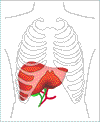May is Hepatitis Awareness Month
Hepatitis B and Hepatitis C can become chronic, life-long infections which can lead to liver cancer. Millions of Americans are living with chronic viral hepatitis, and many do not know they are infected.
CDC’s Division of Viral Hepatitis is leading a national education initiative called Know More Hepatitis. The initiative aims to decrease the burden of chronic viral hepatitis by increasing awareness about this hidden epidemic and encouraging people who may be chronically infected to get tested.
Online Hepatitis Risk Assessment
Know More Hepatitis is being featured in May as part of Hepatitis Awareness Month. This year, May 19th will serve as the first ever Hepatitis Testing Day in the United States. Since chronic hepatitis often does not cause any symptoms until serious liver damage has been done, testing for hepatitis is crucial. Find out if you should be tested by taking a 5 minute online Hepatitis Risk Assessment.
The online assessment is designed to determine an individual’s risk for viral hepatitis and asks questions based upon CDC’s guidelines for testing and vaccination. The Hepatitis Risk Assessment allows individuals to answer questions privately, either in their home or in a health care setting, and print their recommendations to discuss with their doctor.
Hepatitis Testing Day – May 19
May 19th has been designated as a national “Hepatitis Testing Day” in the United States. The CDC will use the first ever Hepatitis Testing Day on May 19, 2012 as an opportunity to remind health care providers and the public who should be tested for chronic viral hepatitis. Help us build our hepatitis testing resources by registering your Hepatitis Testing Day event for May 19th or throughout the month.

Hepatitis Overview
The word “hepatitis” means inflammation of the liver. Hepatitis is most often caused by one of several viruses, which is why it is often called viral hepatitis. In the United States, the most common types of viral hepatitis are Hepatitis A, Hepatitis B, and Hepatitis C.
Chronic Hepatitis can lead to Liver Cancer
Unlike Hepatitis A, which does not cause a long-term infection, Hepatitis B and Hepatitis C can become chronic, life-long infections. Chronic viral hepatitis can lead to serious liver problems including liver cancer. More than 4 million Americans are living with chronic Hepatitis B or chronic Hepatitis C in the United States, but most do not know they are infected. Every year, approximately 15,000 Americans die from liver cancer or chronic liver disease associated with viral hepatitis.
Both Hepatitis B and Hepatitis C can cause liver cancer and have contributed to the increase in rates of liver cancer in recent decades. At least half of new cases of liver cancer are from chronic Hepatitis C.
Priority Populations and Liver Cancer
Some population groups are disproportionately affected by viral hepatitis-related liver cancer. The number of new cases of liver cancer is highest in Asian and Pacific Islanders and is increasing among African Americans, baby boomers, and men.
With early detection, many people can get lifesaving care and treatment that can limit disease progression, and prevent cancer deaths.
Vaccine-preventable: Hepatitis A and Hepatitis B
Hepatitis A and Hepatitis B can both be prevented with vaccines. Cases of Hepatitis A have dramatically declined in the U.S. over the last 20 years largely due to vaccination efforts. The Hepatitis A vaccine is recommended for all children at one year of age and for adults who may be at increased risk.
Unfortunately, many people became infected with Hepatitis B before the Hepatitis B vaccine was widely available. The hepatitis B vaccine is now recommended for all infants at birth and for adults who may be at increased risk.
Follow CDC’s Division of Viral Hepatitis on Twitter @cdchep.
- Please join @CDChep on Thursday, May 17th at 12:00 PM EST for a live Twitterview with @CDCNPIN and @CDC_DrFenton. Dr. Fenton, the Director of the National Center for HIV/AIDS, Viral Hepatitis, STD, and TB Prevention, will be discussing the first ever Hepatitis Testing Day, available resources, and the new Hepatitis Risk Assessment.
- To join in the conversation about viral hepatitis during the month of May, please use the hashtags #HepAware for Hepatitis Awareness Month, #HTD for Hepatitis Testing Day, #HepRisk for the Hepatitis Risk Assessment, and #KMH for the Know More Hepatitis Campaign.
More Information
- CDC Viral Hepatitis Homepage
- Hepatitis Risk Assessment
- Know More Hepatitis
- Hepatitis Testing Day
- Buttons, Radio PSA scripts and other resources for Hepatitis Testing Day and Awareness Month
- Get CDC Viral Hepatitis email updates from GovDelivery
- AIDS.gov Blog Posts

- A Surgeon General’s Perspectives column [PDF - 2 pages] from Dr. Regina Benjamin on raising awareness about viral hepatitis in the May/June issue of Public Health Reports, the official journal of the U.S. Public Health Service


